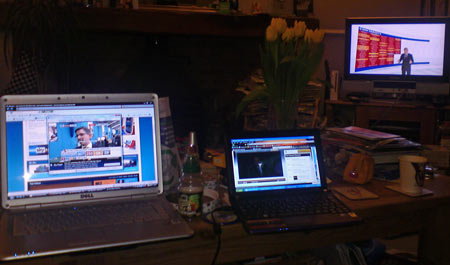Seems to the new catchphrase of the moment — and very apposite as both Cameron and Brown desperately try to convince Clegg that they do agree with him just enough to get him to drop his core demands and prop up their minority parties.
I find politics absolutely enthralling, especially when politicians aren’t in control of events, as in elections, and are unable to spin their way out of setbacks, compromises, about turns, revelations of hypocrisy and duplicity and so on. Election night coverage is fantastic as the politicians have to constantly adjust their positions to the results as they unfold. They normally have to try and pretend they’ve understood the will of the people and accept defeat gracefully through gritted teeth or try not to sound too triumphalist or relieved if they’re winning. Normally by the weekend after the election we’re into some refreshing honesty with the new government trying to dampen the expectations they’ve just spent weeks raising and some public back-biting and candid blame allocation in the defeated parties’ ranks. Not this time, though — the intrigue continues with plenty of politicians petrified of what their party leaders might sign up to and some coded warning shots coming out in interviews.
The aftermath of the election promises to be more fascinating than the election night itself. I stayed up for the whole duration of the BBC Election programme — 9.55pm until 9.30am the next morning. I caught myself nodding off only once or twice for five minutes at a time around 5.30am. I wanted to stay up to see if the Greens won their Brighton seat (who I probably would have voted for if they’d stood in my constituency — which was had no serious candidates as boundary changes have put me in John Bercow’s speaker’s seat). I set myself up with two laptops streaming Sky and ITV’s coverage and which I used in conjunction with the BBC and Guardian websites to do my own analysis on the seats as the counts were announced. (I used up all my remaining mobile broadband allocation for the month by using it to watch the Sky pictures).

Here’s the scene from my sofa with Jeremy Vine on the BBC with Sky on the laptop and ITV on the netbook. (Jeremy Vine is in my academic year — he shares a lot of cultural reference points with me when I hear him on his Radio Two show).
Those on the City Course and close readers of the blog will know that I have about 50,000 words written of a political novel. It’s gone on the backburner a bit for two reasons. One is that I’ve used parts of the City course to develop a new idea — and that’s gone pretty well as ‘The Angel’ is probably a better structured novel. The other is that I’ve been aware of events making my political angles in the novel obsolete or dated — one point being that it involves a New Labour minister. Politics isn’t the main driving force of the plot, though, and a rewrite could probably have made it appropriate to a Tory administration.
But a traditional change of government isn’t what we’re going to get — which means the legacy of Labour is likely to be felt for quite some time, either through their participation in a Lib Dem-Labour coalition or in their machinations if some alternative arrangement works. We’re also likely to have another election sooner or later.
Another interesting factor is the resurgence of interest in politics — with increased turnouts demonstrating the evidence.
So I’m quite encouraged that my political novel isn’t going to be obsolete or dated and might actually have something to say that’s going to be quite relevant to whatever happens in the next couple of years. Also, Oxford East, the constituency that my MP’s is based on stayed Labour against the odds. I just have to get writing the two novels — great fun as the election was it meant I wrote nothing myself.
